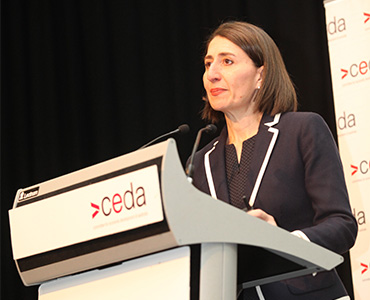Explore our Progress 2050 Goal Tracker
14/12/2016

“There’s no doubt that NSW is leading the nation,” Ms Berejiklian said.
“When we look at the highlights of the half-year review, we have a surplus of nearly $4 billion – $3.97 billion to be precise – and it is up by nearly $260 million from the budget… We have virtually zero net debt.”
“Coming from a position of being last five years ago in the economy, we are now leading the nation. We have the strongest economic growth, the strongest housing supply, the strongest consumer confidence and business investment.
“And we’re doing this while spending record amounts on infrastructure; nearly $73 billion over the next four years.”
Ms Berejiklian said that the State’s strong position put them at a disadvantage when it came to the GST.
“In the forward estimates, we are forecasting strong surpluses, but you see a huge drop in the forward estimates in the strength of the surpluses. And that’s mainly because we’re a victim of our own success with the GST,” she said.
“So the biggest decline is attributable to a reduction in our share of the GST. Just to put in perspective what that means for NSW… over the next four years, with the formula that’s in play, NSW will be receiving $11.3 billion less than we would have, because of our economic strength.”
She continued, “We’re leading the nation by a long way, in all the major indicators, and the formula means we have to subsidise the other states to a greater extent.”
Ms Berejiklian said that because of declining revenue, the government would have to exercise “fiscal discipline”, and ensure that “our expenses growth over the medium term does not exceed our revenue growth”.
“We’re doing that through our wages policy,” Ms Berejiklian said. “As you know, we committed to 2.5 per cent wages (increase caps) for public service employees – and we can offer more than that, if there’s productivity improvements alongside that.
“Our wages policy alone has saved the government $2.7 billion, and we’ve invested that in the frontline. We’ve made sure we’re being as efficient as we can in the back office, with using technology and reducing red tape, to make sure again we’re putting every spare dollar we have on the frontline.
“We are transforming the way we manage our finances. The next budget will be the first time we have digitised the budget processes. We’ll have real time information, line by line, on what’s happening throughout the year in terms of budget management and fiscal discipline.”
Ms Berejiklian also spoke about the government’s asset recycling policy.
“Since the budget, we completed two significant transactions in our asset recycling strategy,” she said.
“The first is Ausgrid, and we were thrilled with the outcome – all Aussie super consortia, providing the State with gross proceeds of $16.2 billion. We actually just recently banked that cheque, and got nearly half a billion in stamp duty as a one-off from that transaction.
“And of course I want to remind you all that as we still own 49 per cent, we have an equity interest in the business, but also more importantly we maintain our role … as lessor, licenser and investor.
“Another key transaction is … Pillar (Administration). Pillar is one of the largest super businesses in Australia. Since 2008, the previous government had spoken about offloading Pillar to the private sector because there’s a lot of competition in that sector and the private sector can actually do a better job of – not only keeping on – but getting new members for that fund.
“We’re thrilled that Mercer was successful in that and… we were able to extract a 10-year operations guarantee for the Illawarra. That business is in the Illawarra, and the new owners have committed to supporting that community for at least the next decade – and we feel that they will actually grow the business and be there for decades.”
CEDA members can listen to audio from the Mid-year economic update.
